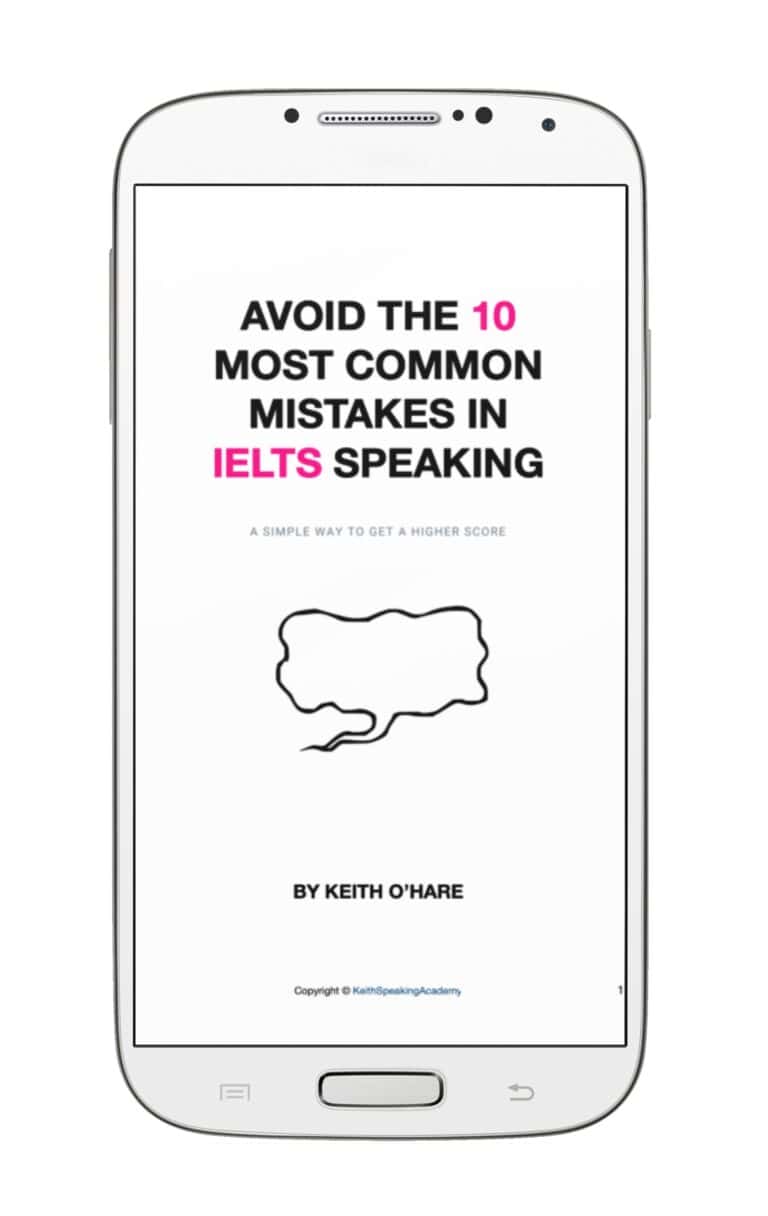Introduction
Skills in IELTS Speaking is a really tricky topic. In this lesson, you will learn how to talk about your skills and what skills you learned as a child and what skills young people will need in the future.
Download this IELTS Speaking Lesson PDF

Keith O'Hare
Trinity Dip TESOL, MSc Digital Education (U.K.) A lover of languages, teaching and lasagna!
I have taught over 10,000 students from over 20 different countries worldwide on my online courses, many having passed the exam with a band 7, 8 and even some 9s, so hopefully, I know what I am doing! Enjoy this lesson!
What you will Learn
IELTS Vocabulary: Topic of Skills
The word ‘skill’ can be both countable and uncountable.
When it is activity that needs training, then it is countable.
It’s an important skill (countable)
The following are all important skills
- riding a bike
- using a computer
- active listening
I like to learn new skills
I have a lot of skills
Students need a wide range/set of skills
When we talk about ‘skill’ as the ability to do something well, then it is uncountable.
This job requires a lot of skill (uncountable)
Synonyms can be:
- expertise
- special ability
- proficiency
Messi has a lot of skill when it comes to football
He has a lot of skill in/at football
We can summarise the difference in the examples below:
I have great cooking skills (countable)
= I can bake, roast, steam, boil, peel, chop…. (a lot of abilities)
I have a great cooking skill (uncountable)
= my overall ability is great
Collocations and Adjectives
I have good _____ skills
I have good communication/cooking/painting skills
I have advanced computer skills
I have interpersonal skills
I have practical skills like carpentry
I have management skills
There are 2 key adjectives to learn
- Skilful
- Skilled
Let’s look at these below.
I am skilful at _______ (adj.)
I am quite skilful at baking
Note spelling!
Skillful (U.S. spelling)
Skilful (G.B. Spelling)
Thanks to her skilful handling of the problem, we managed to finish on time
She is a skilful player/performer/teacher
I am a skilled (adj.) teacher, I am skilled at teaching
A skilled engineer/craftsman
A shortage of skilled labor
To skilfully (adv.) steer the conversation to_______ a safer topic (steer = take control of a situation)
As a photographer his skill (n.) in capturing the moment is what makes him remarkable.
More expressions to say you are skilled at something are,
- I’m skilled at cooking
- I am adept at _______ = have a natural ability to do something
- I am a dab hand at _________ = good at
- I am highly skilled at________
I need to hone my (cooking) skills ( = to perfect, to improve)
I need to master the skill of _______

Skills people have and need
If the examiner asks about skills you have, you could talk about “21st Century skills”. Basically these are the soft skills we often learn ‘on the job’. Find out more below.
Soft Skills
(=How you interact with people + how you do things)
- Communication
- Teamwork
- Motivating others
- Leadership
- Socialising
- Interpersonal skills
- Negotiating
- Active listening
- Creativity
- Problem-solving
- Trouble-shooting
Hard skills
(=What you can do based on training or knowledge)
- Using a computer
- Designing a website
- Product knowledge
- Playing the guitar
- Speaking A foreign language

Skills we learn at school
Here are some useful phrases you could use to answer this question.
I learned how to walk as a baby, as well as how to speak
At kindergarten, I guess we picked up painting and how to express our creativity
Our primary school teachers also helped us with social and emotional development, such things as learning how to control our temper
At school, we had to learn the three R’s; Reading, Writing, and Arithmetic
My parents taught me how to respect my elders
I picked up how to be independent of my Dad, but it is a skill I am still honing.
My uncle taught me French, which was a second language for me
I was taught how to solve problems, but things were always black and white, I reckon nowadays children need to know that there are often no right and wrong answers.
Skills we will need in the future
IELTS Speaking Part 3 questions often ask you to think about the future. Here are some phrases you could use.
Many people feel problem-solving will be the most important skill in the future….
…with creativity coming a close second.
A report I read about said that teamwork is valued by many employers but leadership less so, so I guess teamwork will be an essential in the coming years.
Many people, including myself, feel coding will be an essential skill in the years to come, as well as the other hard skill of touch typing.
Also, adaptability and using technology are deemed as being very important, so I reckon young people will need to hone (=develop) these skills.
As technology progresses, it is clear that social media skills and digital marketing will be crucial skills in the future.
I guess we mustn’t underestimate the need for decision-making skills and other similar managerial skills.
In the modern world, I guess critical thinking skills will be really important as people need to evaluate the information they find, and then decide if it is reliable or if it is fake news.
More Free IELTS Speaking Lessons
Do you have any vocabulary you would like to share on this topic. Share your ideas in a comment below, and also let me know what you think of this lesson.
There are more lessons you can follow in the links below too.
Mobile phones in IELTS Speaking. Learn the vocabulary of phones and ideas to talk about how we use phones in our lives.
Climate Change in IELTS Speaking. Learn the essential vocabulary for this topic, as well as how to talk about the causes of and solutions to Climate Change.
Comedy in IELTS Speaking. Learn different types of comedy and idiomatic expressions related to comedy and jokes.
Family in IELTS Speaking. How to talk about your family, stages of life, as well as idioms about family.

